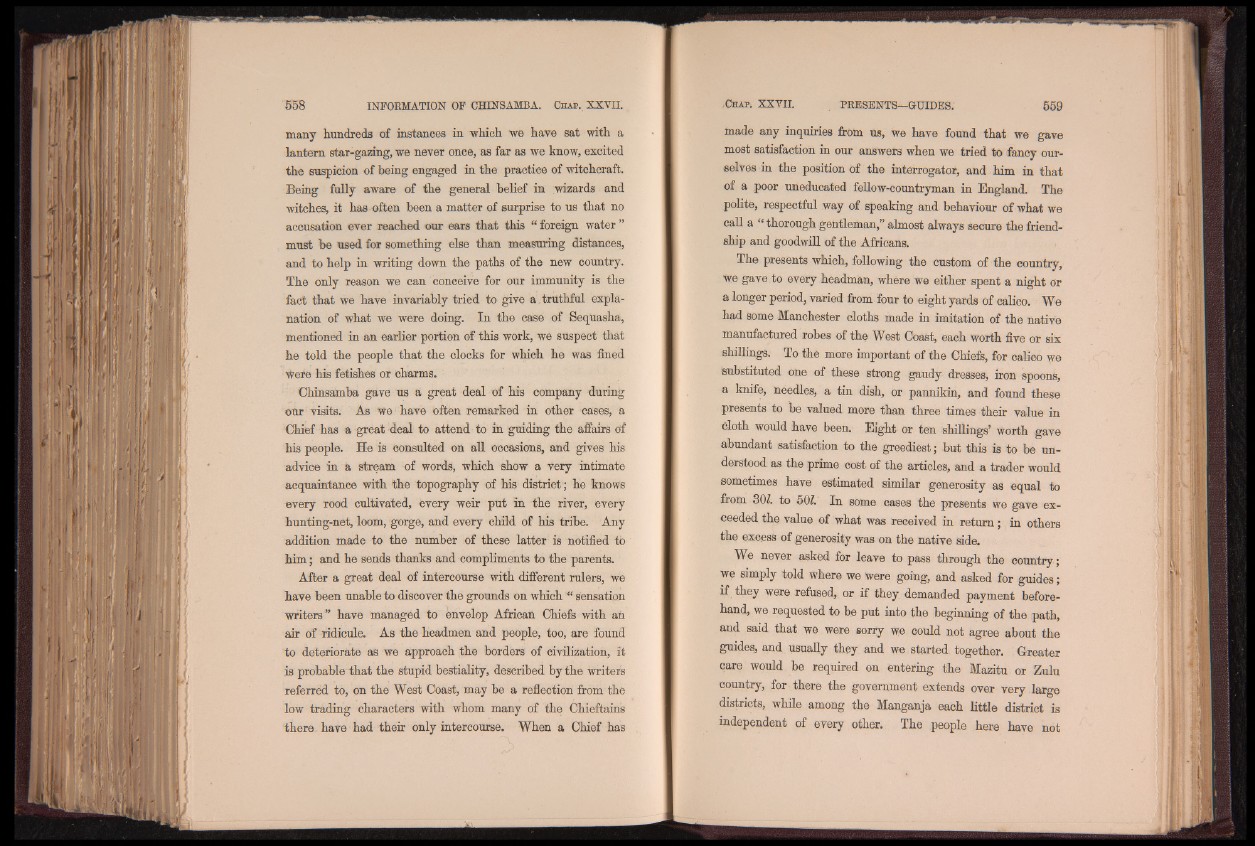
many hundreds of instances in which we have sat with a
lantern star-gazing, we never once, as far as we know, excited
the suspicion of being engaged in the practice of witchcraft.
Being fully aware of the general belief in wizards and
witches, it has often been a matter of surprise to us that no
accusation ever reached our ears that this “ foreign water ”
must be used for something else than measuring distances,
and to help in writing down the paths of the new country.
The only reason we can conceive for our immunity is the
fact that we have invariably tried to give a . truthful explanation
of what we were doing. In the case of Seqtiasha,
mentioned in an earlier portion of this work, we suspect that
he told the people that the clocks for which he was fined
were his fetishes or charms.
Chinsamba gave us a great deal of his company during
our visits. As We have often remarked in other cases, a
Chief has a great deal to attend to in 'guiding the affairs of
his people. He is consulted on all occasions, and gives his
advice in a stream of words, which show a very intimate
acquaintance with the topography of his district ; he knows
every rood cultivated, every weir put in the river, every
hunting-net, loom, gorge, and every child of his tribe. Any
addition made to the number of these latter is notified to
him ; and he sends thanks and compliments to the parents.
After a great deal of intercourse with different rulers, we
have been unable to discover the grounds on which * sensation
writers” have managed to envelop African Chiefs with an
air of ridicule. As the headmen and people, too, are found
to deteriorate as we approach the borders of civilization, it
is probable that the stupid bestiality, described by the writers
referred to, on the West Coast, may be a reflection from the
low trading characters with whom many of the Chieftains
there have had their only intercourse. When a Chief has
made any inquiries from us, we have found that we gave
most satisfaction in our answers when we tried to fancy ourselves
in the position of the interrogator, and him in that
of a poor uneducated fellow-countryman in England. The
polite, respectful way of speaking and behaviour of what we
call a “ thorough gentleman,” almost always secure the friendship
and goodwill of the Africans.
The presents which, following the custom of the country,
we gave to every headman, where we either spent a night or
a longer period, varied from four to eight yards of calico. We
had some Manchester cloths made in imitation of the native
manufactured robes of the West Coast, each worth five or six
shillings. To thè more important of the Chiefs, for calico we
substituted one of these strong gaudy dresses, iron spoonS,
a knife, needles, a tin dish, or pannikin, and found these
presents to be valued more than three times their value in
cloth would have been. Eight or ten shillings’ worth gave
abundant satisfaction to the greediest; but this is to be understood
as the prime cost of the articles, and a trader would
sometimes have estimated similar generosity as equal to
from 301. to 501. In some cases the presents we gave exceeded
the value of what was received in return ; in others
the excess of generosity was on the native side.
We never asked for leave to pass through the country ;
we simply told where we were going, and asked for guides ;
if they were refused, or if they demanded payment beforehand,
we requested to be put into the beginning of the path,
and said that we were sorry we could not agree about the
guides, and usually they and we started together. Greater
care would be required on entering the Mazitu or Zulu
country, for there the government extends over very large
districts, while among the Manganja each little district is
independent of every other. The people here have not